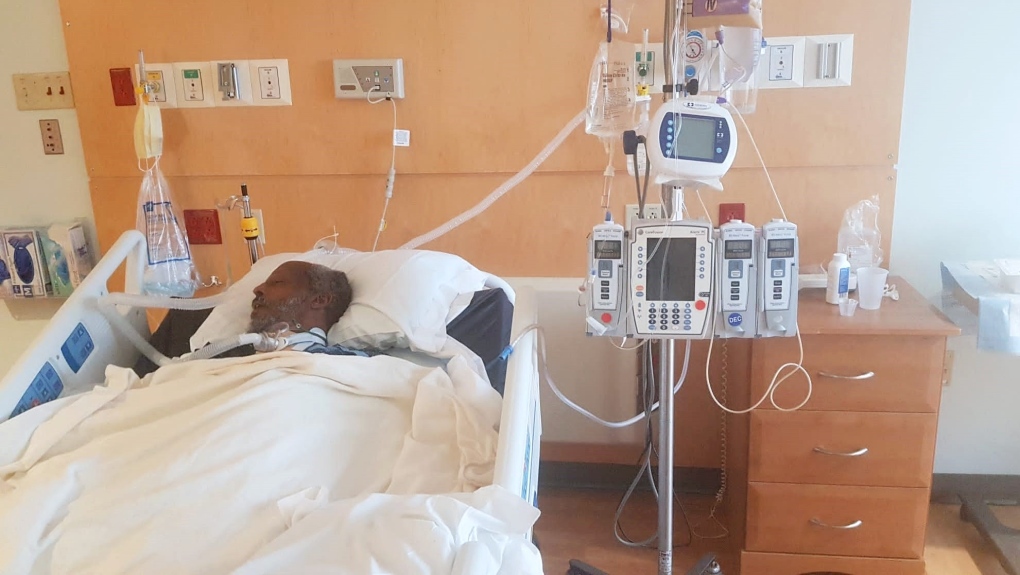Comatose Ontario trucker stuck in U.S after stroke because of overwhelmed hospitals
Friends and family of a Ontario truck driver stuck in an U.S. hospital say they can't believe their attempts to bring him back to Canada are in jeopardy because a local hospital didn't accept him.
Officials from William Osler Heath System pointed to the strain of the Omicron variant, patient surges and staff shortages as the reason their hospital had to turn away an international air ambulance that would have carried Ali Ahmed from Arkansas last Friday.
"Unless they have doctors ready and waiting for him, ambulance ready and waiting for him, a room ready and waiting for him, they won't fly," Ahmed's friend, Ibrahim Bihi, told CTV News Toronto Thursday.
Ahmed's sister, Leyla Palmqvist, who flew from the U.K. to be at Ahmed’s bedside in Little Rock said the uncertainty is adding stress to an already painful journey.
"All I know is that it was really difficult, because this hospital was asking, 'Can we discharge him?' And we didn't know where we could take him. We are hanging in the air," she said.
 Ali Ahmed was carrying goods through Texas when he had a stroke in December. (Supplied)
Ali Ahmed was carrying goods through Texas when he had a stroke in December. (Supplied)
Ahmed was carrying goods through Texas when he had a stroke in December. Paramedics in the U.S. brought him to the University of Arkansas Medical Centre, where he underwent several surgeries, and remains in the ICU, his sister said.
"He survived, but he’s now in a coma," she said.
Ahmed is self-employed and does not have travel medical insurance. His family arranged a $22,500 private flight with the Federal Air Ambulance to bring him to Etobicoke General Hospital on Friday.
But when he time came, the hospital couldn't confirm a bed, the family said.
That left Ahmed stuck in Arkansas, and without insurance, his family says the ICU bed there has cost them $1,000 per day.
Bihi said hospital officials called him Thursday to assure him another plan to bring him to Toronto on Friday would go ahead. But he remained skeptical.
William Osler is among the hardest hit hospital systems during the pandemic. For several days in January, the hospitals declared a “Code Orange” — cancelling non-urgent procedures. It said at the time that was because of a surge in patients and staffing challenges.
"Like many other hospitals across Ontario, Osler continues to experience the impacts of the Omicron variant in terms of occupancy and staffing challenges," the agency said in a statement to CTV News Toronto.
Claudette Holloway of the Registered Nurses Association of Ontario said there was already a shortage of nurses going into the pandemic, and burnout and fatigue have caused many to quit.
“We need a recruitment and retention strategy,” she said. “Nurses don’t want to leave, but they are going to other provinces, some are going across the border, some are retiring earlier than they plan to.
“We need to do all we can and get the premier to act," she said.
Ahmed is a resident of Etobicoke North, and is a constituent of Premier Doug Ford. His office didn’t respond to a request for comment on Thursday.
Meanwhile, Brampton MPP Gurratan Singh said it’s time to find a way to bring Ahmed home.
"It should never have come to this. Mr. Ahmed should be here being treated at his local hospital. It’s terrible that his family is in this situation," he said.
"For years our hospitals have been underfunded and the pandemic has demonstrated how many cracks there are in our hospital system," he said.
CTVNews.ca Top Stories

Trudeau's 2024: Did the PM become less popular this year?
Justin Trudeau’s numbers have been relatively steady this calendar year, but they've also been at their worst, according to tracking data from CTV News pollster Nik Nanos.
Manhunt underway after woman, 23, allegedly kidnapped, found alive in river
A woman in her 20s who was possibly abducted by her ex is in hospital after the car she was in plunged into the Richelieu River.
Calling all bloodhounds: These P.E.I. blood donors have four legs and a tail
Dogs are donating blood and saving the lives of canines at the University of Prince Edward Island's Atlantic Veterinary College in Charlottetown.
Summer McIntosh makes guest appearance in 'The Nutcracker'
Summer McIntosh made a splash during her guest appearance in The National Ballet of Canada’s production of 'The Nutcracker.'
Death toll in attack on Christmas market in Germany rises to 5 and more than 200 injured
Germans on Saturday mourned both the victims and their shaken sense of security after a Saudi doctor intentionally drove into a Christmas market teeming with holiday shoppers, killing at least five people, including a small child, and wounding at least 200 others.
Wild boar hybrid identified near Fort Macleod, Alta.
Acting on information, an investigation by the Municipal District of Willow Creek's Agricultural Services Board (ASB) found a small population of wild boar hybrids being farmed near Fort Macleod.
Toronto firefighters rescue man who fell into sinkhole in Yorkville
A man who fell into a sinkhole in Yorkville on a snowy Friday night in Toronto has been rescued after being stuck in the ground for roughly half an hour.
Winning $20-million Lotto Max ticket sold in Hamilton
Someone who purchased a Lotto Max ticket in Hamilton for Friday night’s draw is now $20-million richer.
Overheated immigration system needed 'discipline' infusion: minister
An 'overheated' immigration system that admitted record numbers of newcomers to the country has harmed Canada's decades-old consensus on the benefits of immigration, Immigration Minister Marc Miller said, as he reflected on the changes in his department in a year-end interview.































